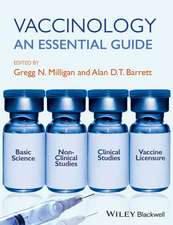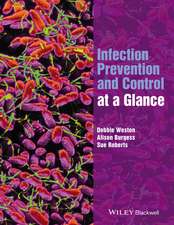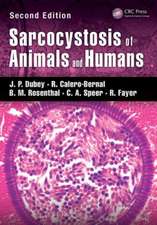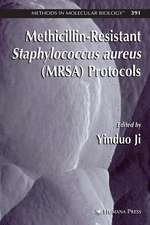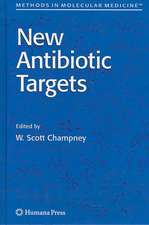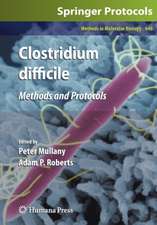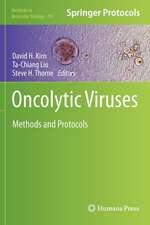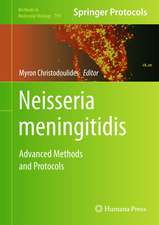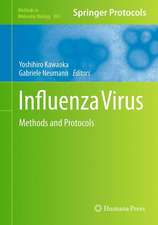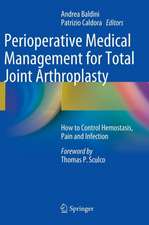Malaria: Methods and Protocols: Methods in Molecular Biology, cartea 923
Editat de Robert Ménarden Limba Engleză Paperback – 23 aug 2016
Authoritative and practical, Malaria: Methods and Protocols, Second Edition, offers a comprehensive set of standard techniques for laboratory researchers.
| Toate formatele și edițiile | Preț | Express |
|---|---|---|
| Paperback (1) | 1178.54 lei 6-8 săpt. | |
| Humana Press Inc. – 23 aug 2016 | 1178.54 lei 6-8 săpt. | |
| Hardback (1) | 1130.43 lei 6-8 săpt. | |
| Humana Press Inc. – 19 sep 2012 | 1130.43 lei 6-8 săpt. |
Din seria Methods in Molecular Biology
- 9%
 Preț: 791.63 lei
Preț: 791.63 lei - 23%
 Preț: 598.58 lei
Preț: 598.58 lei - 20%
 Preț: 882.98 lei
Preț: 882.98 lei -
 Preț: 252.05 lei
Preț: 252.05 lei - 5%
 Preț: 802.70 lei
Preț: 802.70 lei - 5%
 Preț: 729.61 lei
Preț: 729.61 lei - 5%
 Preț: 731.43 lei
Preț: 731.43 lei - 5%
 Preț: 741.30 lei
Preț: 741.30 lei - 5%
 Preț: 747.16 lei
Preț: 747.16 lei - 15%
 Preț: 663.45 lei
Preț: 663.45 lei - 18%
 Preț: 1025.34 lei
Preț: 1025.34 lei - 5%
 Preț: 734.57 lei
Preț: 734.57 lei - 18%
 Preț: 914.20 lei
Preț: 914.20 lei - 15%
 Preț: 664.61 lei
Preț: 664.61 lei - 15%
 Preț: 654.12 lei
Preț: 654.12 lei - 18%
 Preț: 1414.74 lei
Preț: 1414.74 lei - 5%
 Preț: 742.60 lei
Preț: 742.60 lei - 20%
 Preț: 821.65 lei
Preț: 821.65 lei - 18%
 Preț: 972.30 lei
Preț: 972.30 lei - 15%
 Preț: 660.49 lei
Preț: 660.49 lei - 5%
 Preț: 738.41 lei
Preț: 738.41 lei - 18%
 Preț: 984.92 lei
Preț: 984.92 lei - 5%
 Preț: 733.29 lei
Preț: 733.29 lei -
 Preț: 392.60 lei
Preț: 392.60 lei - 5%
 Preț: 746.26 lei
Preț: 746.26 lei - 18%
 Preț: 962.66 lei
Preț: 962.66 lei - 23%
 Preț: 860.22 lei
Preț: 860.22 lei - 15%
 Preț: 652.64 lei
Preț: 652.64 lei - 5%
 Preț: 1055.50 lei
Preț: 1055.50 lei - 23%
 Preț: 883.87 lei
Preț: 883.87 lei - 5%
 Preț: 1141.13 lei
Preț: 1141.13 lei - 19%
 Preț: 491.89 lei
Preț: 491.89 lei - 5%
 Preț: 1038.86 lei
Preț: 1038.86 lei - 5%
 Preț: 524.16 lei
Preț: 524.16 lei - 18%
 Preț: 2122.34 lei
Preț: 2122.34 lei - 5%
 Preț: 1299.23 lei
Preț: 1299.23 lei - 5%
 Preț: 1339.12 lei
Preț: 1339.12 lei - 18%
 Preț: 1390.26 lei
Preț: 1390.26 lei - 18%
 Preț: 1395.63 lei
Preț: 1395.63 lei - 18%
 Preț: 1129.65 lei
Preț: 1129.65 lei - 18%
 Preț: 1408.26 lei
Preț: 1408.26 lei - 18%
 Preț: 1124.92 lei
Preț: 1124.92 lei - 18%
 Preț: 966.27 lei
Preț: 966.27 lei - 5%
 Preț: 1299.99 lei
Preț: 1299.99 lei - 5%
 Preț: 1108.51 lei
Preț: 1108.51 lei - 5%
 Preț: 983.76 lei
Preț: 983.76 lei - 5%
 Preț: 728.16 lei
Preț: 728.16 lei - 18%
 Preț: 1118.62 lei
Preț: 1118.62 lei - 18%
 Preț: 955.25 lei
Preț: 955.25 lei - 5%
 Preț: 1035.62 lei
Preț: 1035.62 lei
Preț: 1178.54 lei
Preț vechi: 1240.56 lei
-5% Nou
Puncte Express: 1768
Preț estimativ în valută:
225.54€ • 244.90$ • 189.45£
225.54€ • 244.90$ • 189.45£
Carte tipărită la comandă
Livrare economică 22 aprilie-06 mai
Preluare comenzi: 021 569.72.76
Specificații
ISBN-13: 9781493959587
ISBN-10: 1493959581
Pagini: 626
Ilustrații: XV, 626 p.
Dimensiuni: 178 x 254 mm
Greutate: 1.1 kg
Ediția:Softcover reprint of the original 2nd ed. 2013
Editura: Humana Press Inc.
Colecția Humana
Seria Methods in Molecular Biology
Locul publicării:Totowa, NJ, United States
ISBN-10: 1493959581
Pagini: 626
Ilustrații: XV, 626 p.
Dimensiuni: 178 x 254 mm
Greutate: 1.1 kg
Ediția:Softcover reprint of the original 2nd ed. 2013
Editura: Humana Press Inc.
Colecția Humana
Seria Methods in Molecular Biology
Locul publicării:Totowa, NJ, United States
Cuprins
In vitro Culturing P. falciparum Erythrocytic Stages.-Production of Plasmodium falciparum Gametocytes in vitro.-In vitro Differentiation of Plasmodium falciparum Gametocytes into Ookinetes.-Ex vivo culture of Plasmodium Vivax and Plasmodium Cynomolgi and in vitro Culture of Plasmodium Knowlesi Blood Stages.-Laboratory Maintenance of Rodent Malaria Parasites.-Transfection of Plasmodium falciparum.-Transfection of Rodent Malaria Parasites.-Recombination-mediated Genetic Engineering of Plasmodium berghei DNA.-Standardization in Generating and Reporting Genetically Modified Rodent Malaria Parasites: The RMgmDB Database.-Transient Transfection of Plasmodium vivax Blood-stage Parasites.-Silencing of Genes and Alleles by RNAi in Anopheles gambiae.-Analysis of Variant Gene Family Expression by Quantitative PCR.-DNA Microarray-based Genome-wide Analyses of Plasmodium Parasites.-Whole-genome Analysis of Plasmodium spp. Utilizing a New Agilent Technologies DNA Microarray Platform.-Transcriptome Analysis using RNA-seq.-Experimental Tools for the Study of Protein Phosphorylation in Plasmodium.-Extraction of Hydrophilic Metabolites from Plasmodium falciparum-infected Erythrocytes for Metabolomic Analysis.-Static and Dynamic Imaging of Erythrocyte Invasion and Early Intra-erythrocytic Development in Plasmodium falciparum.-Flow Cytometry-based Methods for Measurement of Cytosolic Calcium and Surface Protein Expression in Plasmodium falciparum Merozoites.-Microsphiltration: a Microsphere Matrix to Explore Erythrocyte Deformability.-Atomic Force Microscopy of Plasmodium-infected Red Blood Cells for Detecting and Localizing Single Molecular Recognition Events.-Expressing Full-length Functional PfEMP1 Proteins in the HEK293 Expression System.-Genome-wide Chromatin Immunoprecipitation-sequencing in Plasmodium.-In situ Fluorescence Visualization of Transcription Sites and Genomic Loci in Blood Stages of Plasmodium falciparum.-Bioluminescence Imaging of P. berghei Schizont Sequestration in Rodents.-Scoring Sporozoite Motility.-Quantification of Sporozoite Invasion, Migration and Development by Microscopy and Flow Cytometry.-Imaging Sporozoite Cell Traversal in the Liver of Mice.-Analysis of Liver Stage Development in, and Merozoite Release from Hepatocytes.-Quantitative Analysis of Plasmodium berghei Liver Stages by Bioluminescence Imaging.-Activation of Human NK Cells by Plasmodium-infected Red Blood Cells.-Chimeric Parasites as Tools to Study Plasmodium Immunology and Assess Malaria Vaccines.-Development and Use of TCR Transgenic Mice for Malaria Immunology Research.-Tracking the Total CD8 T Cell Response Following Whole Plasmodium Vaccination .-Screening Inhibitors of P. berghei Blood Stages using Bioluminescent Reporter Parasites.-Screening and Evaluation of Inhibitors of Plasmodium falciparum Merozoite Egress and Invasion using Cytometry.-Induction of anti-Plasmodium Immunity Following Sub-patent Infection with Live Erythrocytic Stages and Drug Cure.-Vaccination using Radiation-or Genetically-Attenuated Live Sporozoites.-Vaccination using Normal Live Sporozoites Under Drug Treatment.-Assessing Transmission Blockade in Plasmodium spp. .-Mosquito Transgenic Technologies to Reduce Plasmodium Transmission..-Silencing of Genes and Alleles by RNAi in Anopheles gambiae.-Analysis of Variant Gene Family Expression by Quantitative PCR.-DNA Microarray-based Genome-wide Analyses of Plasmodium Parasites.-Whole-genome Analysis of Plasmodium spp. Utilizing a New Agilent Technologies DNA Microarray Platform.-Transcriptome Analysis using RNA-seq.-Experimental Tools for the Study of Protein Phosphorylation in Plasmodium.-Extraction of Hydrophilic Metabolites from Plasmodiumfalciparum-infected Erythrocytes for Metabolomic Analysis.-Static and Dynamic Imaging of Erythrocyte Invasion and Early Intra-erythrocytic Development in Plasmodium falciparum.-Flow Cytometry-based Methods for Measurement of Cytosolic Calcium and Surface Protein Expression in Plasmodium falciparum Merozoites.-Microsphiltration: a Microsphere Matrix to Explore Erythrocyte Deformability.-Atomic Force Microscopy of Plasmodium-infected Red Blood Cells for Detecting and Localizing Single Molecular Recognition Events.-Expressing Full-length Functional PfEMP1 Proteins in the HEK293 Expression System.-Genome-wide Chromatin Immunoprecipitation-sequencing in Plasmodium.-In situ Fluorescence Visualization of Transcription Sites and Genomic Loci in Blood Stages of Plasmodium falciparum.-Bioluminescence Imaging of P. berghei Schizont Sequestration in Rodents.-Scoring Sporozoite Motility.-Quantification of Sporozoite Invasion, Migration and Development by Microscopy and Flow Cytometry.-Imaging Sporozoite Cell Traversal in the Liver of Mice.-Analysis of Liver Stage Development in, and Merozoite Release from Hepatocytes.-Quantitative Analysis of Plasmodium berghei Liver Stages by Bioluminescence Imaging.-Activation of Human NK Cells by Plasmodium-infected Red Blood Cells.-Chimeric Parasites as Tools to Study Plasmodium Immunology and Assess Malaria Vaccines.-Development and Use of TCR Transgenic Mice for Malaria Immunology Research.-Tracking the Total CD8 T Cell Response Following Whole Plasmodium Vaccination .-Screening Inhibitors of P. berghei Blood Stages using Bioluminescent Reporter Parasites.-Screening and Evaluation of Inhibitors of Plasmodium falciparum Merozoite Egress and Invasion using Cytometry.-Induction of anti-Plasmodium Immunity Following Sub-patent Infection with Live Erythrocytic Stages and Drug Cure.-Vaccination using Radiation-or Genetically-Attenuated LiveSporozoites.-Vaccination using Normal Live Sporozoites Under Drug Treatment.-Assessing Transmission Blockade in Plasmodium spp. .-Mosquito Transgenic Technologies to Reduce Plasmodium Transmission.
Textul de pe ultima copertă
Over the past ten years, many powerful new techniques have been developed that have dramatically changed malaria research. The second edition of Malaria: Methods and Protocols expands upon the previous edition with current, detailed techniques for laboratory research. With new chapters on parasite culture techniques, genome manipulation methods, "omic" approaches, and techniques for studying the biology of the red blood cell and pre-erythrocytic stages of Plasmodium. Written in the highly successful Methods in Molecular Biology series format, chapters include introductions to their respective topics, lists of the necessary materials and reagents, step-by-step, readily reproducible laboratory protocols, and tips on troubleshooting and avoiding known pitfalls.
Authoritative and practical, Malaria: Methods and Protocols, Second Edition offers a comprehensive set of standard techniques for laboratory researchers.
Authoritative and practical, Malaria: Methods and Protocols, Second Edition offers a comprehensive set of standard techniques for laboratory researchers.
Caracteristici
Presents definitive protocols for malaria researchers Provides step-by-step detail essential for reproducible results Contains key notes and implementation advice from the experts


